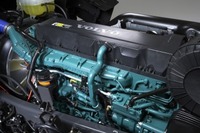Volvo’s Trucks 100 times cleaner in 20 years
 Volvo Trucks is now introducing a new generation of diesel engines with extremely low emissions of air pollutants. Over the past two decades, Volvo’s trucks have become 100 times cleaner.
Volvo Trucks is now introducing a new generation of diesel engines with extremely low emissions of air pollutants. Over the past two decades, Volvo’s trucks have become 100 times cleaner. “We are now down to such low emissions of air pollutants that we are approaching long-term sustainable levels,” says Lars Mårtensson, environmental affairs officer at Volvo Trucks. “As a result, we can fully concentrate on further cutting fuel consumption and lowering the climate impact of our trucks.”
20 per cent lower fuel consumption
“Even today, a diesel-powered truck is highly fuel-efficient,” says Lars Mårtensson. “Compared with a regular passenger car, a 40-tonne Volvo truck consumes just five times as much fuel, even though it transports 30 times as much weight.”
At the same time as exhaust emissions have dropped so considerably, fuel consumption and carbon dioxide emissions have been reduced by about 20 percent. Volvo Trucks’ aim is to continue this trend by cutting fuel consumption by at least one percent per year on average.
Cleaner exhaust emissions
The most recent generation of Volvo engines is both the most fuel-efficient and cleanest ever. Through optimised combustion and effective exhaust treatment, Volvo’s engine technicians have succeeded in combining low emissions with low fuel consumption. For a truck with Volvo’s best-selling 13-litre engine and Volvo I-Shift automated gearchanging system, fuel consumption and carbon dioxide emissions have been cut by up to three percent in one single step. The other engines are also clearly more fuel-efficient than before.
Emissions of air pollutants meet the new Euro 5 emission regulations that come into force this autumn. Several of Volvo’s new engines are also available in variants tailored for the EEV (Enhanced Environmentally friendly Vehicle) norm. This is a voluntary framework of regulations with even lower emissions of soot and particulates and it can be applied by local authorities to speed up the introduction of less environmentally impacting vehicles.
Potential for even lower levels
“With the renewal of our entire engine range, all these improvements will have a broad impact and will quickly promote significant environmental benefits,” says Lars Mårtensson. “Apart from continuously improving our diesel engines, we are also investing considerable resources in the development of hybrid vehicles and other technologies that offer considerable potential for radical reductions in fuel consumption and climate impact.”

